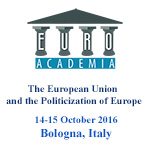Euroacademia Conferences
 Europe Inside-Out: Europe and Europeanness Exposed to Plural Observers (9th Edition) April 24 - 25, 2020
Europe Inside-Out: Europe and Europeanness Exposed to Plural Observers (9th Edition) April 24 - 25, 2020 Identities and Identifications: Politicized Uses of Collective Identities (9th Edition) June 12 - 13, 2020
Identities and Identifications: Politicized Uses of Collective Identities (9th Edition) June 12 - 13, 2020 8th Forum of Critical Studies: Asking Big Questions Again January 24 - 25, 2020
8th Forum of Critical Studies: Asking Big Questions Again January 24 - 25, 2020 Re-Inventing Eastern Europe (7th Edition) December 13 - 14, 2019
Re-Inventing Eastern Europe (7th Edition) December 13 - 14, 2019 The European Union and the Politicization of Europe (8th Edition) October 25 - 26, 2019
The European Union and the Politicization of Europe (8th Edition) October 25 - 26, 2019 Identities and Identifications: Politicized Uses of Collective Identities (8th Edition) June 28 - 29, 2019
Identities and Identifications: Politicized Uses of Collective Identities (8th Edition) June 28 - 29, 2019 The European Union and the Politicization of Europe (7th Edition) January 25 - 26, 2019
The European Union and the Politicization of Europe (7th Edition) January 25 - 26, 2019 7th Forum of Critical Studies: Asking Big Questions Again November 23 - 24, 2018
7th Forum of Critical Studies: Asking Big Questions Again November 23 - 24, 2018 Europe Inside-Out: Europe and Europeanness Exposed to Plural Observers (8th Edition) September 28 - 30, 2018
Europe Inside-Out: Europe and Europeanness Exposed to Plural Observers (8th Edition) September 28 - 30, 2018 Identities and Identifications: Politicized Uses of Collective Identities (7th Edition) June 14 - 15, 2018
Identities and Identifications: Politicized Uses of Collective Identities (7th Edition) June 14 - 15, 2018
The Role of Civilizational Identity in Shaping Public Attitudes on Foreign Policy
-
-

-
Presentation speakers
- Osman Sabri Kiratli, Boğaziçi University, Istanbul, Turkey
Abstract:
Even though, early research on public opinion and foreign policy considered foreign policy a policy area where the input of public opinion is limited at best, more recent literature, criticized this early position, first by suggesting that public opinion on foreign policy is in fact coherent and stable and second, by addressing cases where public opinion made a difference in foreign policy. These studies also pointed out that growing public interest in foreign policy has resulted in a structural change in domestic political competition as political parties and domestic elites have found an incentive to differentiate themselves from others and reorient based on public opinion. Though it is maintained that public opinion on foreign policy matters, it is an open question, however, how public attitudes on foreign policy are shaped. The dominant strand of research on public opinion formation focuses on rational decision-making processes as the driving force of public opinion. An alternative view though, individuals form their opinion based on an appropriate course of action derived from the identity they have constructed for themselves. This route makes the epistemological assumption that identities precede interests such that to understand the interests, one must shed light on the identity of social actors. Following the constructivist route, this study aims to analyze the role of identity on individual attitudes on foreign military interventions. More specifically, drawing from the literature on democratic peace theory and clash of civilizations this paper investigates to what extent culturally and ideologically similar countries will be labelled as ‘we’ by the public and perceived positively whereas dissimilar countries will be perceived as ‘others’ which will be followed by a negative reaction in foreign policy attitudes. Thus, two hypotheses are tested: One, individuals who perceive their home country and target country as belonging to the same civilizational group are less likely to support military intervention against the target country; and two, individuals who believe their home country and target country have the same type of political system are less likely to support military intervention against the target country. To test these hypotheses, a large-scale survey was implemented in Turkey on a national representative sample with 1,596 respondents and is currently in the process of being implemented in Greece with a sample size of 566 respondents. The stratified sampling procedure with quotas based on age, gender, city and SES (socioeconomic status groups) is used in the surveys. The interviewees are randomly selected based on their addresses within these predefined pools. Within the survey, two novel experiments are conducted: In the first experiment, respondents in the treatment groups are given the information that the target country is either a European or Middle Eastern country in the Turkish survey and either West European or East Orthodox European country in the Greek survey. In the second experiment, instead of civilizational affiliation, the respondents are told that the target country is either a democratic or authoritarian country. This study believes that choosing two countries on the peripheries of Europe, one an EU member and the other a candidate country but both dramatically affected by deepening economic and political crises in recent years, will allow us to understand public preferences in other European states, which are slowly but surely starting to experience the strains of illegal immigration derived from ongoing conflicts in the Middle East and Eastern Europe, rising nationalism and increasing domestic tensions. Furthermore, by analyzing the role of ideational factors in two countries with historical, social and cultural trajectories structurally different from the United States and other Western European countries where the great majority of public opinion research is conducted, this project will also put the external validity of insights of existing analyses on foreign aid to the test.
-
Related Presentations













